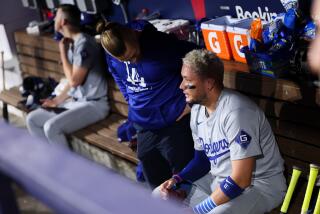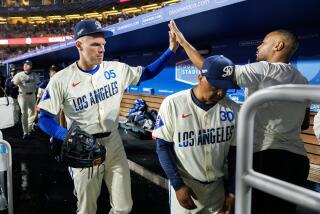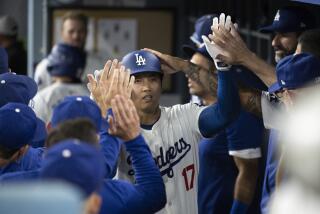Manny Ramirez suspended 50 games for positive drug test
There was a lectern set up behind home plate at Dodger Stadium on Thursday, just as it was nine months ago, when Manny Ramirez was ceremoniously introduced to Los Angeles.
Only this time, Dodgers Manager Joe Torre was standing there, looking into a wall of television cameras and recalling how Ramirez sounded “devastated” when they spoke earlier in the day. General Manager Ned Colletti said he felt “sick and saddened.”
Ramirez, the All-Star outfielder who revitalized a once-proud franchise mired in mediocrity and coined the term “Mannywood,” had become the most famous player to be suspended under the drug policy implemented by baseball in 2004.
Testing positive in spring training for a female fertility drug that is used by steroid users to restore testosterone production to normal levels, the 36-year-old Ramirez received a 50-game ban, costing him $7.7 million of his $25-million salary and the Dodgers a potent middle-of-the-lineup bat that took them to their first National League Championship Series in 20 years.
Ramirez, who was replaced on the active roster by minor league call-up Xavier Paul, is eligible to return July 3.
“It’s sort of like somebody punching a hole in the balloon,” Torre said.
The Times was the first to report Ramirez’s suspension on its website Thursday morning.
Ramirez was nowhere to be seen before, during or after a loss to the Washington Nationals, which ended the Dodgers’ home winning streak at 13.
The only public statement made by Ramirez was in a news release issued by the players’ union. Ramirez blamed the test result on medication prescribed to him by a doctor for a “personal health issue.” He did not disclose the medication, doctor or health issue.
“He gave me a medication, not a steroid, which he thought was OK to give me,” Ramirez said in the statement. “Unfortunately, the medication was banned under our drug policy. Under the policy, that mistake is now my responsibility. I have been advised not to say anything more for now.”
The medication in question was human chorionic gonadotropin, or HCG, according to a source familiar with the situation not authorized to publicly discuss the issue.
A high-ranking sports doping authority said HCG could legitimately be prescribed for a man who does not naturally produce enough testosterone, but BALCO founder and convicted steroid dealer Victor Conte said it is often used to replenish testosterone levels at the end of a cycle of steroid treatments
HCG is one of dozens of substances prohibited under baseball’s policy. Players can call a hotline to check the legality of any substance and can get a therapeutic-use exemption for any legitimate medical use of a banned substance.
An appeal hearing was scheduled for Wednesday -- baseball’s top lawyer, Rob Manfred, flew from New York to Los Angeles the previous day -- but sources said Ramirez dropped the appeal on the advice of his agent, Scott Boras.
Ramirez noted in the statement that he had passed “around 15” drug tests over the last five years. He also issued a widespread apology.
“L.A. is a special place to me and I know everybody is disappointed,” he said. “So am I. I’m sorry about this whole situation.”
Torre described Ramirez’s remorse as sincere.
“The thing that was toughest for Manny is how he disappointed everyone,” Torre said.
Colletti said the Dodgers would stand behind Ramirez and applauded the way he handled the matter.
“Whenever somebody makes a mistake and they accept responsibility . . . are contrite, it’s a plus,” Colletti said. “And that’s what Manny did today. Had he dismissed it or acted like it was somebody else’s fault, I’d really have a tough time with it. But that he takes ownership of what transpired speaks to the man . . . that’s not bad . . . that’s part of being human.”
Torre and Colletti said they didn’t learn of the situation until owner Frank McCourt called them after midnight the previous night. Asked by The Times after Wednesday night’s game whether they had heard that Ramirez was about to be suspended, Torre and Colletti denied knowing anything.
A source close to Ramirez said Ramirez’s agent had informed Torre of the matter before Wednesday’s game, a claim the manager denied. Ramirez was taken out of the lopsided game in the seventh inning and wasn’t in the locker room when reporters came in.
Until Torre and Colletti addressed reporters at the 4:30 p.m. news conference, the Dodgers limited their comments on the matter to a short statement by McCourt’s wife that was e-mailed to reporters.
At 3:10 p.m., a sign was posted on the door of the Dodgers’ clubhouse that read, “Clubhouse closed.”
Inside, the Dodgers held a team meeting.
“It was somber,” right fielder Andre Ethier said.
Players said they were surprised to learn that Ramirez had flunked a drug test -- to a certain extent.
“It’s to the point where nothing shocks you,” Doug Mientkiewicz said.
Last week, Mientkiewicz answered questions regarding steroid allegations involving his former high school teammate, New York Yankee Alex Rodriguez.
Rodriguez, the game’s highest-paid player, acknowledged during a February news conference that he used steroids from 2001 to 2003. The admission followed a Sports Illustrated report that he failed a drug test in 2003, when players were not subject to suspension.
Torre said Ramirez’s standing in the game shouldn’t be affected.
“It doesn’t change my view of his accomplishments as a player,” Torre said. “What I learned is how hard he works. He spends a lot of time practicing his trade.”
Nationals first base coach Marquis Grissom, who played with Ramirez in Cleveland in 1997, shared the same view.
“He’s been great since the first time I laid eyes on him,” Grissom said, adding that Ramirez “no doubt” belongs in the Hall of Fame.
Torre said he reminded his players they’d have to win without Ramirez.
“This is a man’s game,” Torre said.
Mientkiewicz agreed.
“This is a team,” Mientkiewicz said. “This isn’t the Los Angeles Mannys.”
Ethier said it would be important for the players to not try too hard to compensate for Ramirez’s absence.
“I think if we put too much of a chip on our shoulders, we could start pressing,” said Ethier, who inherited Ramirez’s role as the No. 3 hitter.
First baseman James Loney said he wanted to see Ramirez back in the clubhouse. While serving his suspension, Ramirez can work out with the team but must be out of uniform by the start of the game.
Torre said Ramirez wanted to clear his mind before deciding where he would prepare himself for his return. Ramirez was planning to return to his home in Miami for at least a few days, according to a source in his camp.
Also uncertain was whether the Dodgers would use the money saved on Ramirez during his suspension to sign a free-agent pitcher such as Pedro Martinez, Ben Sheets or Paul Byrd. Because Ramirez agreed to be paid only $10 million this season -- the other $15 million was to be deferred -- the Dodgers are saving just $3.1 million this year. Ramirez can exercise a $20-million option for 2010.
--
Times staff writers Bill Shaikin and Lance Pugmire contributed to this report.
More to Read
Are you a true-blue fan?
Get our Dodgers Dugout newsletter for insights, news and much more.
You may occasionally receive promotional content from the Los Angeles Times.







